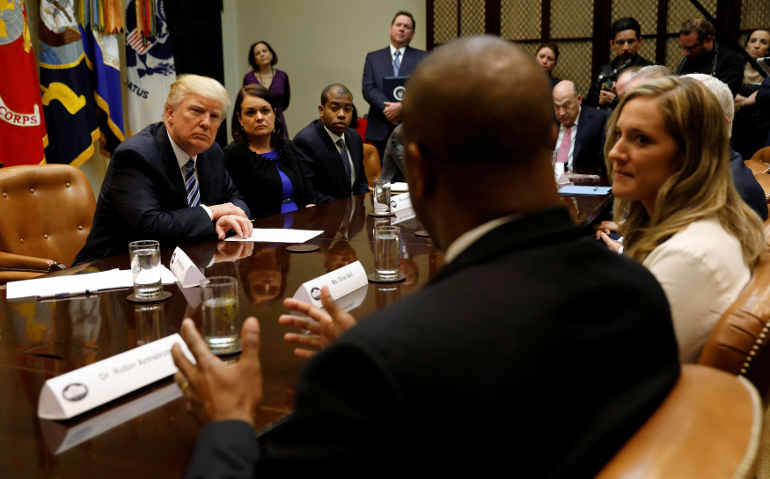
U.S. President Donald Trump listens during a meeting about healthcare at the White House March 13. (Reuters/Kevin Lamarque)
Update: Congressional Budget Office files report on GOP health plan, finds that the plan would make millions more uninsured.
A non-partisan report expected as soon as today on the costs of a Republican plan to replace the Obamacare healthcare law could harden opposition to the proposal, adding to the obstacles facing President Donald Trump's first major legislative effort.
The Congressional Budget Office, which provides official cost estimates for legislation, is widely expected to find the Republican plan will result in fewer Americans with health insurance than under the Affordable Care Act, former Democratic President Barack Obama's signature domestic legislation. The report could come as early as March 13.
Just days before taking office in January, Trump promised "insurance for everybody" in his Obamacare replacement.
House of Representatives Speaker Paul Ryan, the Republican healthcare plan's top backer in Congress, acknowledged on CBS' "Face the Nation" program March 12 that the CBO projections would likely show a decline in insurance coverage because the legislation would drop an Obamacare provision mandating that Americans obtain health insurance or pay a fine.
"The one thing I'm certain will happen is CBO will say: 'Well, gosh. Not as many people will get coverage,'" Ryan said. "You know why? Because this isn't a government mandate."
Ryan added the Republican plan would lower healthcare costs and allow more people to afford coverage if they want it.
He said he expected the CBO report on Monday or Tuesday (March 13 or 14).
The House Republican legislation would also roll back an expansion of Medicaid insurance for the poor, and replace Obamacare's income-based subsidies with a system of fixed tax credits to help people buy private insurance on the open market.
The credit rating agency Standard &; Poor's has estimated 6 million to 10 million people could lose health insurance under the Republican plan, known as the American Health Care Act.
It would cancel tax revenues worth at least $600 billion over 10 years, according to Congress' Joint Committee on Taxation.
Republicans downplay report
The CBO report is needed to determine the full budgetary impact of the legislation -- whether the savings from the Medicaid cuts and lower subsidy costs are enough to offset the loss of tax revenues.
Republicans have long opposed Obamacare, saying it was government overreach and led to higher insurance premiums. Trump, a Republican, has called the law a "disaster" and made its repeal and replacement a key campaign pledge.
Democrats and some influential Republicans say the legislation to replace Obamacare would rip health insurance away from millions of Americans and increase costs for many others. The 2010 law provided 20 million previously uninsured Americans with health coverage.
On MArch 12, senior Trump administration officials attacked the CBO's credibility and downplayed the upcoming report.
"We will see what the score is. In fact in the past, the CBO score has really been meaningless," Gary Cohn, director of the White House National Economic Council, told "Fox News Sunday."
Republicans have sharply criticized the CBO for its past estimates that 22 million people would buy insurance through Obamacare's government-run exchanges by 2016, when that number only came to about 10.4 million, according to Department of Health and Human Services data.
HHS Secretary Tom Price pledged on "Meet the Press" that "nobody will be worse off financially" under the Republican plan.
Still, the plan faces an uphill battle winning support in the Republican-controlled Congress. In the face of unified opposition from Democrats, Republicans can only afford to lose 21 votes in the House and two votes in the Senate.
Several conservative Republicans in the House said the plan was too similar to the Obamacare provisions it would replace, while some Republicans are concerned it will not lead to more affordable healthcare coverage.
[Additional reporting by Doina Chiacu; Editing by Caren Bohan and Peter Cooney.]
